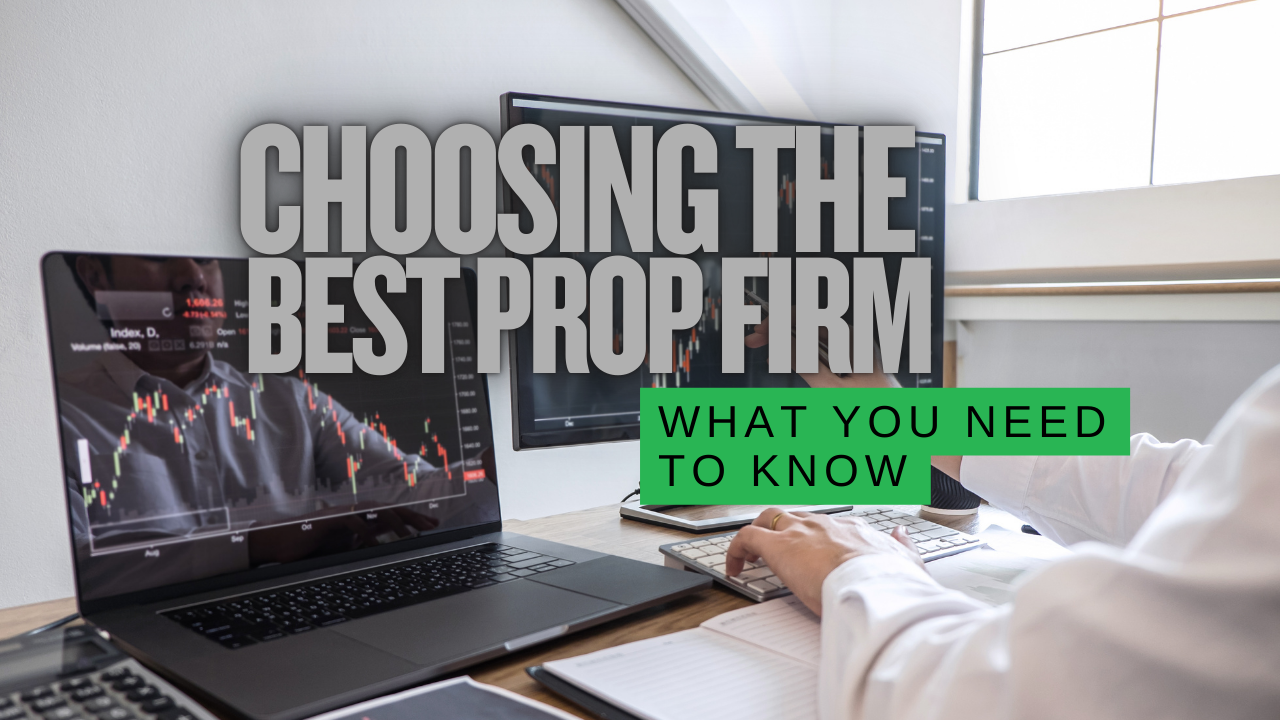
Choosing the Best Prop Firm: What You Need to Know
Finding the right proprietary trading firm can be a game-changer for traders looking to access capital, develop their skills, and grow in a professional trading environment. However, with so many firms available, each with different structures, risk management policies, and payout models, choosing the right one can feel overwhelming.
This guide breaks down the different types of prop firms, key factors to consider when making your decision, and how to match a firm with your trading style. Whether you are a scalper, swing trader, or long-term investor, selecting the right firm can significantly impact your success and profitability.
Types of Proprietary Trading Firms
Proprietary trading firms generally fall into three categories, each with unique funding models, profit splits, and trading environments.
1. Evaluation-Based Prop Firms
These firms require traders to pass an evaluation or challenge before receiving access to funding. Traders must demonstrate profitability while adhering to strict risk parameters.
Key Characteristics:
✅ Traders pay an upfront fee to participate in an evaluation.
✅ Firms set profit targets (typically 5-10%) and strict drawdown limits.
✅ If traders pass, they receive a funded account with a profit-sharing model.
✅ No licensing or capital contribution is required.
Pros:
✅ No personal risk after passing the evaluation.
✅ High-profit splits, often 75-90%.
✅ Scalable funding based on performance.
Cons:
❌ Traders must meet strict challenge conditions, which can be difficult.
❌ Most firms impose restrictions on overnight or weekend holding.
❌ Traders may need to pay multiple times if they fail the challenge.
Best for: Scalpers and short-term traders who can meet profit targets quickly without exceeding drawdowns.
2. Structured Proprietary Firms
Structured prop firms provide direct access to firm capital without requiring traders to pass an evaluation challenge. Instead, they focus on training and mentorship, ensuring traders develop the necessary skills before trading with firm funds. These firms often require traders to complete a training program or risk evaluation period before they are granted capital.
Example: Maverick Trading
Maverick Trading is a structured prop firm that specializes in options and forex trading. Traders must complete a training program, demonstrating their ability to manage risk and execute trades effectively. Upon successful completion, they can access firm capital to trade with a 70/30 profit split to begin with, where traders keep 70% of their profits. Maverick also offers scaling opportunities, allowing traders to increase their capital allocation as they demonstrate consistency and profitability.
Key Characteristics:
✅ Traders can receive direct funding after completing training rather than passing an evaluation challenge.
✅ Typically, a capital contribution or training fee is required before accessing firm funds.
✅ Strong mentorship and educational resources to help traders develop long-term skills.
✅ Structured risk management rules and career growth opportunities for traders who perform well.
Pros:
✅ Access to firm capital after meeting training and performance requirements.
✅ Professional development and mentorship from experienced traders.
✅ Scaling opportunities—successful traders can increase their capital allocation over time.
✅ Firm-provided resources, including advanced trading platforms and risk management tools.
Cons:
❌ Initial training cost or capital contribution may be required.
❌ Profit splits start lower than some evaluation-based firms (e.g., 70/30 vs. 80/20).
❌ Traders must adhere to firm-imposed risk guidelines and trading strategies.
Best for: Traders looking for a structured career path with mentorship, education, and a long-term opportunity in proprietary trading.
3. Equity-Based Prop Firms
These firms operate like traditional trading desks where traders receive access to firm capital and execute trades on behalf of the firm. Traders may need to register with financial regulators and sometimes contribute capital.
Key Characteristics:
✅ Registration with financial authorities may be required.
✅ Traders typically trade stocks, options, and futures.
✅ Profit splits vary widely but often start lower than evaluation-based firms.
✅ In some cases, traders may work in-office with direct oversight.
Pros:
✅ Access to institutional trading tools and direct market access.
✅ Opportunities for full-time employment and trading desk roles.
✅ Higher leverage and lower trading costs.
Cons:
❌ Licensing and capital contribution requirements can be a barrier.
❌ Some firms require traders to work in-office rather than remotely.
❌ Lower profit splits for newer traders.
Best for: Experienced traders interested in career-based prop trading, especially those specializing in equities and options.
The Rise of Referral-Based and MLM-Style Prop Firms
While most proprietary trading firms focus on trader performance, some challenge-based firms have adopted business models that resemble multi-level marketing (MLM) structures. These firms encourage traders to recruit new members instead of prioritizing actual trading success.
How to Spot an MLM-Style Prop Firm
❌ Signs of an MLM-Style Prop Firm:
- Heavy promotion of referral bonuses rather than actual trading performance.
- Discounts or commissions offered to traders who get others to sign up for evaluations.
- Revenue primarily coming from traders failing challenges rather than firm profits from trading.
- Traders reporting delayed or denied payouts, with the firm focusing more on signing up new members.
- Frequent changes to rules or payout structures, making it difficult for traders to consistently withdraw earnings.
Are Challenge Firms the Same as MLMs?
Most legitimate challenge-based prop firms, such as FTMO and TopStep, focus on evaluating a trader’s skill rather than requiring them to recruit others. Some firms have affiliate programs, but these are typically optional and do not impact a trader’s funding or career prospects.
However, some lesser-known firms operate in a gray area, aggressively promoting referral programs and incentivizing traders to bring in new members rather than trade successfully. If a firm appears to prioritize marketing over actual trading, this is a red flag.
What to Look for in a Legitimate Challenge Firm
✅ How to Identify a Legitimate Firm:
- Transparent payout history: Look for verifiable proof that traders are consistently paid their earnings.
- Clear trading rules: Legitimate firms focus on risk management and consistency, not recruitment.
- No forced selling: You should never feel pressured to bring in new traders to maintain your funding.
- Established reputation: Research how long the firm has been in operation and check trader reviews.
Key Factors to Consider When Choosing a Prop Firm
1. Profit Splits and Fees
Not all profit splits are created equal. Some firms offer up to 90% payouts, while others keep a larger share to cover training and resources. It’s also important to factor in evaluation fees, withdrawal conditions, and scaling policies.
2. Risk Management Policies
Prop firms impose risk management rules to protect their capital. Understanding these restrictions is crucial, as violating them can lead to account suspension or loss of funding.
3. Trading Style Compatibility
Different firms cater to different trading styles, so choosing one that aligns with your strategy is essential.
4. Scaling and Growth Opportunities
Some firms allow traders to increase their capital allocation as they meet profit milestones, while others have fixed limits on the amount of firm capital a trader can manage.
5. Firm Reputation and Longevity
The prop trading industry has firms with strong track records and others that have questionable business models. Researching a firm’s reputation is critical to avoid scams or poorly managed firms.
Final Thoughts
Choosing the right proprietary trading firm depends on your trading style, experience level, and career goals. Evaluation-based firms are best for traders who can pass challenges, structured firms offer a career path with mentorship, and equity-based firms cater to those looking for professional trading desk roles.
Be especially cautious of firms that emphasize recruitment over trading performance. While many challenge firms are legitimate, some have questionable business practices that prioritize referral commissions over trader success. By doing proper research and selecting a firm that aligns with your goals, you can maximize your chances of success in proprietary trading.
